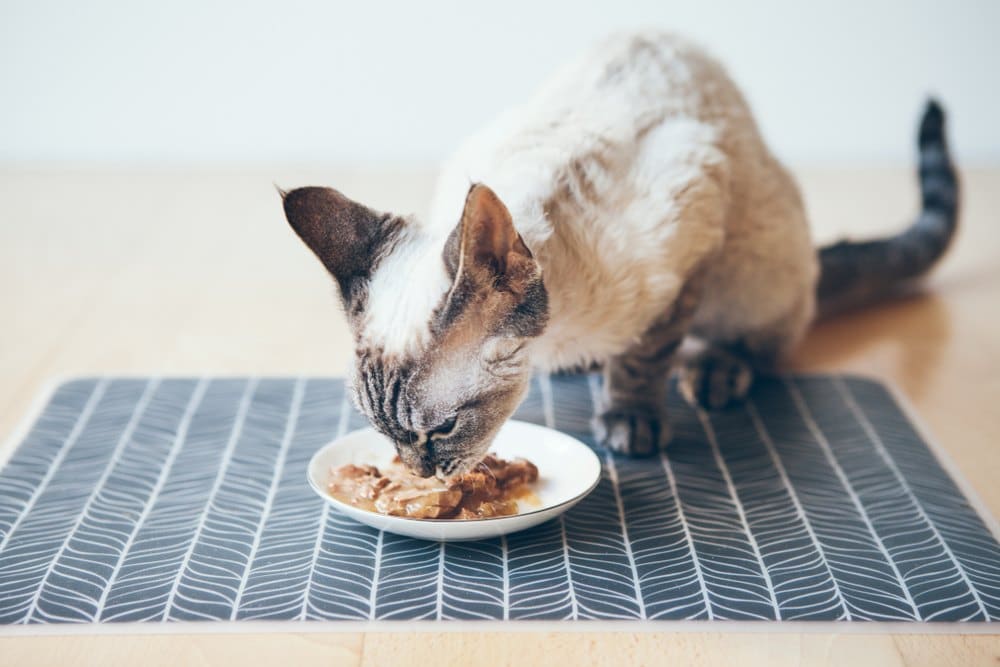
Finding treats for a picky cat can be stressful. Treats can be expensive, so you likely don’t want to buy a bunch of packages only for your cat not to eat them. Below, we’ve reviewed 10 of our favorite treats for picky cats. These are specifically designed with taste in mind while still being a healthy option.
A Quick Comparison of Our Favorites of 2024
| Image | Product | Details | ||
|---|---|---|---|---|
| Best Overall |

|
Friskies Salmon Cat Treat |
|
CHECK PRICE |
| Best Value |

|
Fancy Feast Variety Cat Treats |
|
CHECK PRICE |
| Premium Choice |

|
Tiki Cat Velvet Mousse Pack |
|
CHECK PRICE |

|
Weruva Variety Cat Pouches |
|
CHECK PRICE | |

|
Tiki Cat Stix Tuna Cat Treats |
|
CHECK PRICE |
The 10 Best Cat Treats
1. Friskies Lil’ Soups with Salmon Lickable Cat Treat – Best Overall
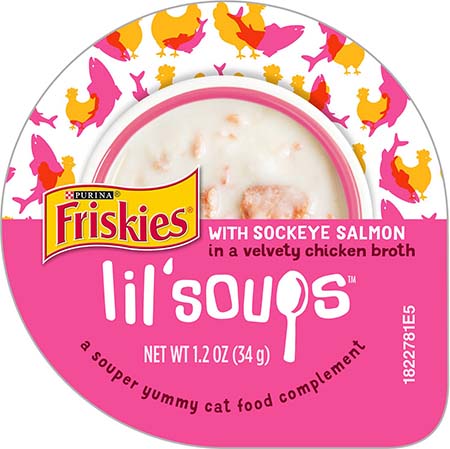
| Ingredients: | Chicken Broth, Chicken, Sockeye Salmon |
| Protein: | 9.0% |
| Fat: | 0.05% |
Out of all the treat options on the market, the Friskies Lil’ Soups with Sockeye Salmon Lickable Cat Treats are the tastiest. Unlike most treats, this option is basically wet food—only tastier. Chicken broth is included as the first ingredient, with bits of chicken and salmon floating in the broth. Cats are often drawn to broths and wet foods. They’re smellier, and much of a cat’s taste is tied to their smell. If your feline refuses to eat the typical hard treats, this may be a suitable option. The ingredient list is quite high-quality as well. It’s mostly just animal products, including chicken and salmon. These ingredients make the protein quite high, though the fat content is extremely low.
While this food is quite nutritious, you shouldn’t feed it as a major part of your pet’s meal. It includes only 18 calories per cup, so each container shouldn’t include enough to fill your cat up, leaving plenty of room for their usual food.
Plus, this formula includes no artificial colors, flavors, or preservatives. It’s also completely grain-free. In fact, it doesn’t even include any fruits or veggies – just meat.
- High-quality ingredients
- Broth-based
- Designed for picky eaters
- Nutritious
- Somewhat difficult to feed
2. Fancy Feast Purely Natural Treats Variety Cat Treats – Best Value

| Ingredients: | Chicken, Tuna, or Salmon |
| Protein: | 20.0%—25.0% |
| Fat: | 0.3% to 1.0% |
If you’re looking to save a bit of money, Fancy Feast Purely Natural Treats Variety Pack Cat Treats is a great value buy. The treats in this variety pack are only bits of meat. Real meat. There aren’t any other additives or anything of that sort.
This pack comes in three different flavors: chicken, tuna, and salmon. The only ingredients are chicken, tuna, or salmon; no fillers. They aren’t freeze-dried, either. The moisture content is quite high, in fact. Plus, unlike a lot of other tasty treats, these are easy to train with. They’re basically pieces of real meat packaged in individual serving sizes. Therefore, they are also very high in protein while remaining low in fat. The salmon treats are a bit higher in fat than other options, but that’s simply the nature of salmon.
There are no by-products or fillers in these treats. They’re completely natural! The only downside to these treats is that they can be a bit messy. You are feeding your feline bits of meat, after all. They aren’t the hard, easily packaged treats that the market is usually flooded with.
When you consider their price, it’s easy to see that these are the best cat treats for picky cats for the money.
- Bits of meat
- Pre-portioned in stay-fresh pouches
- Three different flavors
- High moisture content
- Can be messy
3. Tiki Cat Velvet Mousse Variety Pack – Premium Choice

| Ingredients: | Tuna Broth, Tuna, Mackerel, Dried Egg, Sunflower Oil |
| Protein: | 12.0% to 14.0% |
| Fat: | 2.0% to 5.3% |
For those willing to spend a bit more money on their cat’s treats, we highly recommend the Tiki Cat Velvet Mousse Variety Pack. This pack by Tiki Cat includes many different flavors. Unlike other treats, these come in a mousse form. Many cats prefer this over hard treats, as it includes more moisture. As you might imagine, this makes it taste and smell much stronger than hard treats.
Each recipe is made with high-quality protein. For instance, the tuna recipe we specifically looked at included tuna broth as the first ingredient, followed by both tuna and mackerel. These ingredients provide plenty of protein and amino acids, making this a nutritious and tasty snack.
These recipes are completely grain-free and naturally low in carbohydrates. There are absolutely no potatoes, corn, wheat, or rice included. For this reason, this recipe may be suitable for felines with sensitive stomachs.
They are designed to complement your cat’s usual diet, not completely replace it, however. They aren’t a complete meal.
- Grain-free
- Made with mostly meat products
- Mousse form
- Low in carbohydrates
- Expensive
4. Weruva Cats in the Kitchen Variety Pack Cat Food Pouches

| Ingredients: | Chicken (Boneless, Skinless Breast), Chicken Broth, Pumpkin, Tapioca Starch, Sunflower Seed Oil |
| Protein: | 9.0% |
| Fat: | 1.4% |
The Weruva Cats in the Kitchen Variety Pack Cat Food Pouches can be both a treat and your cat’s main meal. Therefore, you don’t have to worry about replacing your cat’s normal diet. These can replace your cat’s normal diet and still provide complete and balanced nutrition.
This variety pack comes with a variety of different pouches of cat food. Each pouch is designed to be easy to open and straightforward to feed. Of course, you can’t exactly use this as a training treat. The wet food design makes that a bit difficult!
All the necessary vitamins and minerals your cat needs to thrive are included. Taurine is added as well to support your cat’s heart health.
This recipe is completely free from grains, gluten, and GMO ingredients. It includes only natural ingredients, making it a higher quality option than most other cat treats out there.
With tons of tasty gravy, most cats will absolutely love this food – even if they happen to be pickier. This recipe helps your feline stay properly hydrated as well since it includes a very high moisture content.
- Easy-to-use pouches
- Free from grains, gluten, and GMO ingredients
- Added gravy for flavor
- Complete and balanced
- Can’t be used as training treats
5. Tiki Cat Stix Tuna Cat Treats

| Ingredients: | Tuna Broth, Tuna, Dried Egg, Natural Tuna Flavor, Natural Chicken Flavor |
| Protein: | 9.0% |
| Fat: | 2.0% |
Tiki Cat makes great cat treats—and their Tiki Cat Stix Tuna Cat Treats are just as good as their other options.
Tuna broth and tune are included as the first ingredients. Other high-quality ingredients are also added, including dried eggs. It is completely free from grains, peas, corn, wheat, soy, and GMOs. All the ingredients included are completely natural.
These sticks have a much higher moisture content than other treats. Therefore, they are smellier and often tastier for our felines. Your cat’s sense of smell and taste are inherently tied together. Therefore, smelly things tend to taste stronger – making these a perfect option for picky cats.
Each pouch is conveniently pre-portioned. They are easy to travel with, though you can’t use them as training treats easily. They are also a bit messier than other treats available out there.
Like most foods on this list, the added moisture can help your feline stay hydrated. If your cat struggles with urinary tract issues, the extra moisture may be exactly what they need.
- Contains high levels of moisture
- Only natural ingredients
- Pre-portioned pouches
- Can’t be used as training treats
6. Instinct Raw Boost Mixers Chicken Recipe Cat Food Topper

| Ingredients: | Chicken (with Ground Chicken Bone), Chicken Liver, Pumpkin Seeds, Chicken Heart, Carrots |
| Protein: | 36.0% |
| Fat: | 26.0% |
While they’re technically a food topper, a bag of Instinct Raw Boost Mixers Chicken Recipe Cat Food Topper can easily be used as treats as well. As the name suggests, this treat is made from freeze-dried bites of chicken.
However, there are other ingredients as well. For instance, carrots and pumpkin seeds are both included. These provide extra nutrients and flavors to the treats. For the most part, the ingredients used are quite high-quality.
This formula is protein-packed and high in fat as well. It includes significantly higher levels of fat and protein than other treats out there, though the moisture content is much lower. As you might imagine, this lower moisture content may make some cats turn their nose up to these treats.
However, their freeze-dried design makes them easy to use as training treats. They’re also tastier than most hard treats since they’re made with actual chicken.
The recipe includes absolutely no grain, potato, corn, wheat, or soy. Artificial colors and preservatives are missing from the ingredient list as well.
- High in protein and fat
- Includes mostly chicken
- Easy to use as training treats
- Not as tasty as some other options
- Low moisture content
7. Tiki Cat Broths Variety Pack Wet Cat Food Topper

| Ingredients: | Fish Broth, Tuna, Fish Extract |
| Protein: | 7.0% |
| Fat: | 0.05% |
Once again, Tiki Cat lands on our list. This time, we’re reviewing the Tiki Cat Broths Variety Pack Wet Cat Food Topper. This product is designed to be a food topper. However, you can also use it as a treat on some occasions.
This variety pack comes with four different recipes. Each one starts with some sort of broth, such as fish broth. Of course, this makes the treat extremely soupy. You will need to pour each pouch into a bowl. You can’t exactly use these treats for training purposes!
However, if you’re just looking for a yummy snack for your feline, this cat topper is a solid option. You can put it on top of your cat’s usual food or serve it separately.
These pouches are completely free from grains, corn, wheat, and soy. They also don’t contain any sugar, starch, or salt. They may be suitable for felines with sensitive stomachs since each pouch mostly just contains a meat broth of some sort.
- High in moisture
- Topper and treat
- Free from grains, corn, wheat, and soy
- Messy
- Can’t be used as a training treat
8. American Journey Landmark Broths Seafood Pouches

| Ingredients: | Fish Broth, Tuna, Shrimp, Tilapia, Sunflower Oil |
| Protein: | 8.0% to 10.5% |
| Fat: | 1.5% to 2.0% |
The American Journey Landmark Broths Seafood Pouches are similar to the others we’ve reviewed on this list. It includes mostly broth with bits of meat floating around. It isn’t designed to be used as a complete meal since it doesn’t contain all the added vitamins and minerals your cat needs.
However, this formula is high in moisture. It may be a good option for cats with urinary tract problems and similar issues.
This variety pack includes many different flavors. The variety may prevent your cat from getting bored, and it also encourages your feline to eat treats day after day. When you’re dealing with a particularly picky cat, this variety may be exactly what you need.
Like many formulas on our list, this one is free from grains, potatoes, animal by-products, fillers, and artificial preservatives.
The pouches aren’t super easy to open, though. The formula also seems to be messier than most. Of course, some cats also don’t like broth-heavy foods.
- Quality ingredients
- Variety pack
- High in moisture
- Not easy to open
- Messy
9. Merrick Backcountry Real Rabbit Recipe Cat Food Pouches

| Ingredients: | Deboned Rabbit, Lamb Broth, Beef Broth, Beef Liver, Deboned Lamb |
| Protein: | 9.0% |
| Fat: | 3.0% |
The Merrick Backcountry Real Rabbit Recipe Cat Food Pouches do include high-quality ingredients. The ingredient list is full of different meat products, including rabbit and beef liver. Many different kinds of broths are included as well, improving the moisture content substantially.
There are no additives, grains, glutens, wheat, corn, soy, or other low-quality ingredients in these cat treats, either. They are made with only top-quality ingredients.
With the added gravy, these pouches may be exactly what your picky feline is looking for! The added moisture adds quite a bit of flavor as well, which can be extremely helpful for felines on the pickier side.
This formula includes quite a few omega fatty acids, supporting your cat’s skin and coat health.
With that said, these pouches aren’t that much different from the previous options we’ve reviewed. However, they are substantially more expensive. You’re going to pay almost double for the same thing you could find elsewhere. This raised price is largely due to the unique meat types, such as rabbit.
However, most cats won’t benefit from eating rabbit meat.
Of course, you can’t use these treats for training, either.
- Added gravy
- No additives
- High-quality meat ingredients
- Messy
- Can’t be used as training treats
- Expensive
10. Greenies Feline Tempting Tuna Flavor Adult Dental Cat Treats
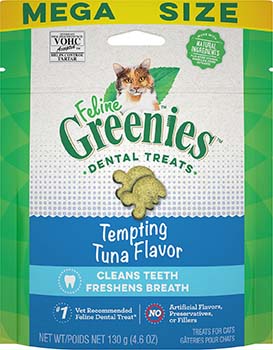
| Ingredients: | Chicken Meal, Ground Wheat, Brewers Rice, Corn Gluten Meal, Poultry Fat |
| Protein: | 27.0% |
| Fat: | 12.0% |
Out of all the treats on our list, the Greenies Feline Tempting Tuna Flavor Adult Dental Cat Treats are the only hard treats we’ve included.
Most picky cats just aren’t drawn to traditional hard treats. They aren’t super tasty and have little to no smell. Plus, they are often full of lower-quality ingredients. These particular hard treats may be better than most, but they still have many of these problems.
For instance, the first ingredient is chicken meal, which is high-quality meat. However, the next ingredient is wheat, followed by brewer’s rice, corn gluten meal, and poultry fat. For this reason, we don’t particularly recommend these treats for most cats.
However, they are a better option if you’re specifically looking for training treats or if your cat particularly likes hard treats.
Otherwise, one of the high-moisture options above may be more suitable.
- Can be used as training treats
- Lower-quality ingredients
- Little meat included
- Expensive
Buyer’s Guide: Selecting The Best Cat Treat for Picky Cats
Choosing the correct cat treats for your feline is always difficult. You want to ensure that the treats are satisfying – but also healthy. While cat treats tend to have fewer ingredients than your average cat food, the list can still be overwhelming.
When your cat is picky too, it can be even more difficult to choose an appropriate food for your feline! You may find food that marks all your boxes, but your cat may completely turn their nose up to it.
Each cat is different in its preferences. However, most seem to have the same general habits when it comes to food. In this section, we’ll review some key concepts to keep in mind when looking for treats for your picky cat.
Cats and Taste
A cat’s sense of taste is fairly similar to ours. Their sense of taste and smell are linked. Therefore, how food smells has a substantial role in how it tastes.
If you have a cold and can’t smell, things taste different! That’s because your sense of smell influences your sense of taste heavily. Our cats are the same way.
The actual flavor of the food likely plays a significantly smaller role in whether or not our cats like something. After all, they only have 500 taste buds. We have 9,000. They simply don’t taste as strongly as we do.
Sadly, most cat treats are hard and don’t smell very strongly. Most of them hardly even smell at all! Therefore, when our cat goes to eat them, they probably won’t taste like much. Remember, cats have a much stronger smell than we do, so smell likely plays a more significant role in their preferences.
For this reason, wet treats are often a better option for picky cats. These can be a bit more difficult to feed since you can’t hand each piece to their feline. However, they are often smellier and therefore tastier for our cats.
On top of the smell, the texture is also important. Some cats may be very particular about their food’s texture. If the texture is off at all, they may refuse to eat it.
Hard treats often have a pretty uniform texture, though some of them are more textured than others. Some cats do prefer the crunchiness of hard foods. However, others don’t like the crunch and prefer wet foods instead.
This matter depends completely on your particular cat.
Ingredients
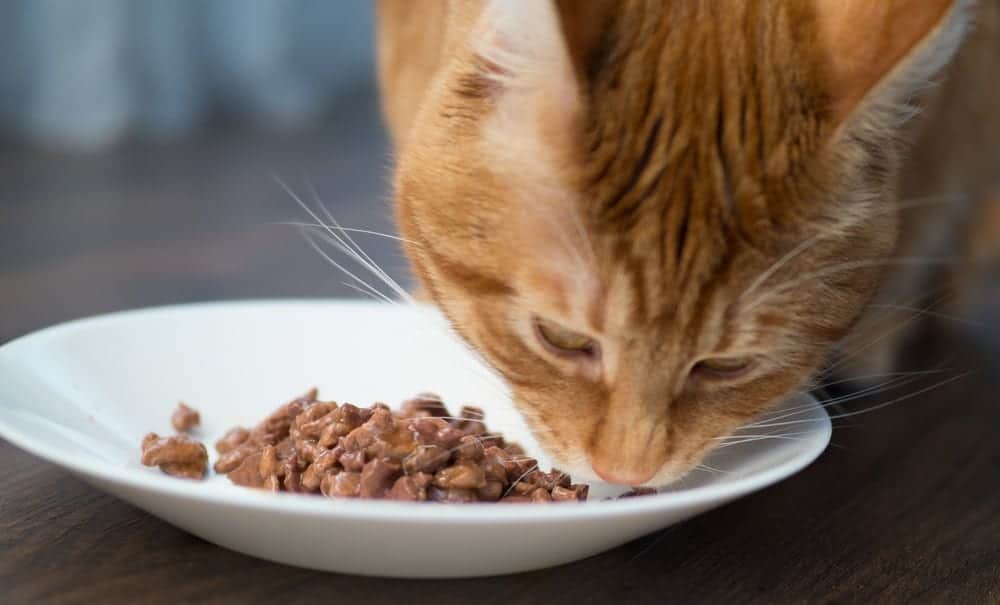
The ingredients in a cat treat are essential. They will affect the overall nutrition of the food, as well as the taste.
For the most part, fat is what gives food its flavor. The only exception to this is artificial flavors, which are not fat-based. Still, artificial flavors are not a very good option for most felines. If a food needs to beef up its flavor by adding artificial flavors, it’s a sign that the fat content is quite low.
Cats are designed to live off a diet of mostly meat. They’re obligate carnivores, after all. Therefore, most of the fat they consume should come from high-quality meat.
Whole meats are preferable. However, meat meals are also a good option as long as they are named. You want to know the source of the meat meal – not feed your cat mystery meat.
Some fruits and veggies are commonly added to cat food to increase the nutritional content. However, because they are so low in fat, they don’t have much of an effect on the food’s flavor. You don’t have to pick out treats that contain fruits.
After all, they’re treats – not your cat’s complete meal.
Price
We’d all love it if money wasn’t a contending factor – but it usually is. There are many cat treats out there at a whole range of prices.
The cheapest options are usually the lowest quality. Typically, these foods will include inexpensive, low-quality ingredients like corn gluten meal. Obviously, these aren’t the best options for your cat.
However, that doesn’t necessarily mean that all inexpensive treats are low-quality. There are a few wet treat options that include mostly meat and are very affordable.
At the same time, there are some very expensive treats out there. For the most part, these treats usually contain lots of rare meat cuts, like boar and rabbit. Your cat won’t necessarily benefit from these meat types. In the end, meat is meat.
Therefore, you can save lots of money by purchasing food that uses a cheaper protein source, like chicken or beef.
Macronutrient Content
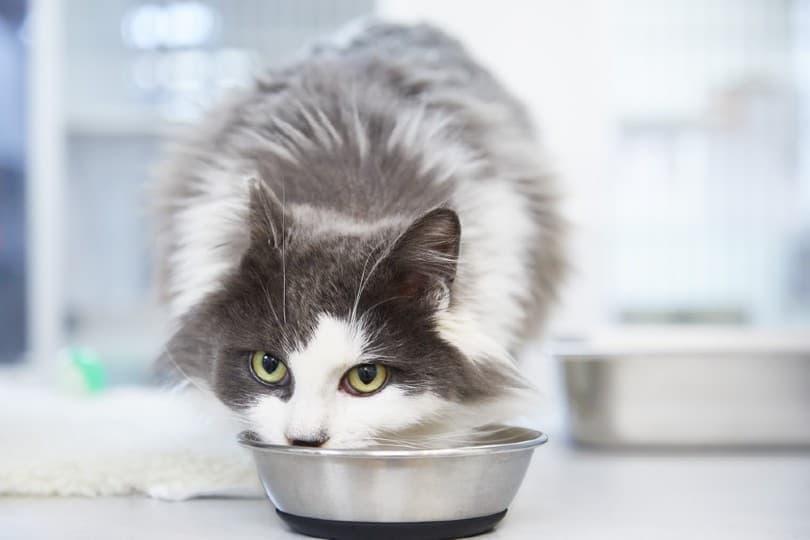
The protein and fat content of food matter. Cats are obligate carnivores, so they are designed to live off of protein and fat. Some carbohydrates are okay, but they shouldn’t be eaten in high amounts. They simply don’t provide your feline with everything they need.
However, many cat foods include a lot of carbohydrates because they’re cheap. Wheat is cheaper to purchase in bulk than meat, for instance.
Because these are treats, many companies cut corners even more. After all, the treats don’t have to provide all the nutrition your cat needs. They should be consuming their normal food too.
Therefore, it is vital to check the ingredient list and macronutrient content.
Protein and fat should be considerably high. However, be aware that the moisture content does matter as well. Foods with higher moisture contents will naturally be lower in protein. But this doesn’t mean that they are actually lower in protein – the moisture content just makes it look like there are lower amounts of protein.
Wet foods should be higher in moisture and therefore lower in protein and fat, according to the label. Dry foods should be much higher, but of course, that doesn’t mean that they actually have more.
Wet vs. Dry Treats
Wet treats are often the tastiest options out there. However, that doesn’t necessarily mean that all picky cats will prefer wet foods. Some will like the crunch of the dry treats, especially if they simply like the texture.
We recommend trying wet treats if your cat is pickier. But don’t be surprised if your feline wants crunchy treats instead!
Final Thoughts
There are countless treats on the market. Most of them are not suitable for picky cats. They’re very low in fat and moisture, which often makes them less than tasty. However, there are many gravies and wet treat options that are often tastier.
We recommend Friskies Lil’ Soups with Sockeye Salmon Lickable Cat Treats. These wet treats are extremely moisture-rich and high in fat. Therefore, they are often extremely tastier.
If you’re on a budget, we recommend Fancy Feast Purely Natural Treats Variety Pack Cat Treats. These are still tasty treats due to their higher moisture contents. However, they are far less expensive than other options.
We hope our in-depth reviews helped you choose the perfect treats for your feline!
Featured Image Credit: Veera, Shutterstock
Contents
- A Quick Comparison of Our Favorites of 2024
- The 10 Best Cat Treats
- 1. Friskies Lil’ Soups with Salmon Lickable Cat Treat – Best Overall
- 2. Fancy Feast Purely Natural Treats Variety Cat Treats – Best Value
- 3. Tiki Cat Velvet Mousse Variety Pack – Premium Choice
- 4. Weruva Cats in the Kitchen Variety Pack Cat Food Pouches
- 5. Tiki Cat Stix Tuna Cat Treats
- 6. Instinct Raw Boost Mixers Chicken Recipe Cat Food Topper
- 7. Tiki Cat Broths Variety Pack Wet Cat Food Topper
- 8. American Journey Landmark Broths Seafood Pouches
- 9. Merrick Backcountry Real Rabbit Recipe Cat Food Pouches
- 10. Greenies Feline Tempting Tuna Flavor Adult Dental Cat Treats
- Buyer’s Guide: Selecting The Best Cat Treat for Picky Cats
- Final Thoughts













